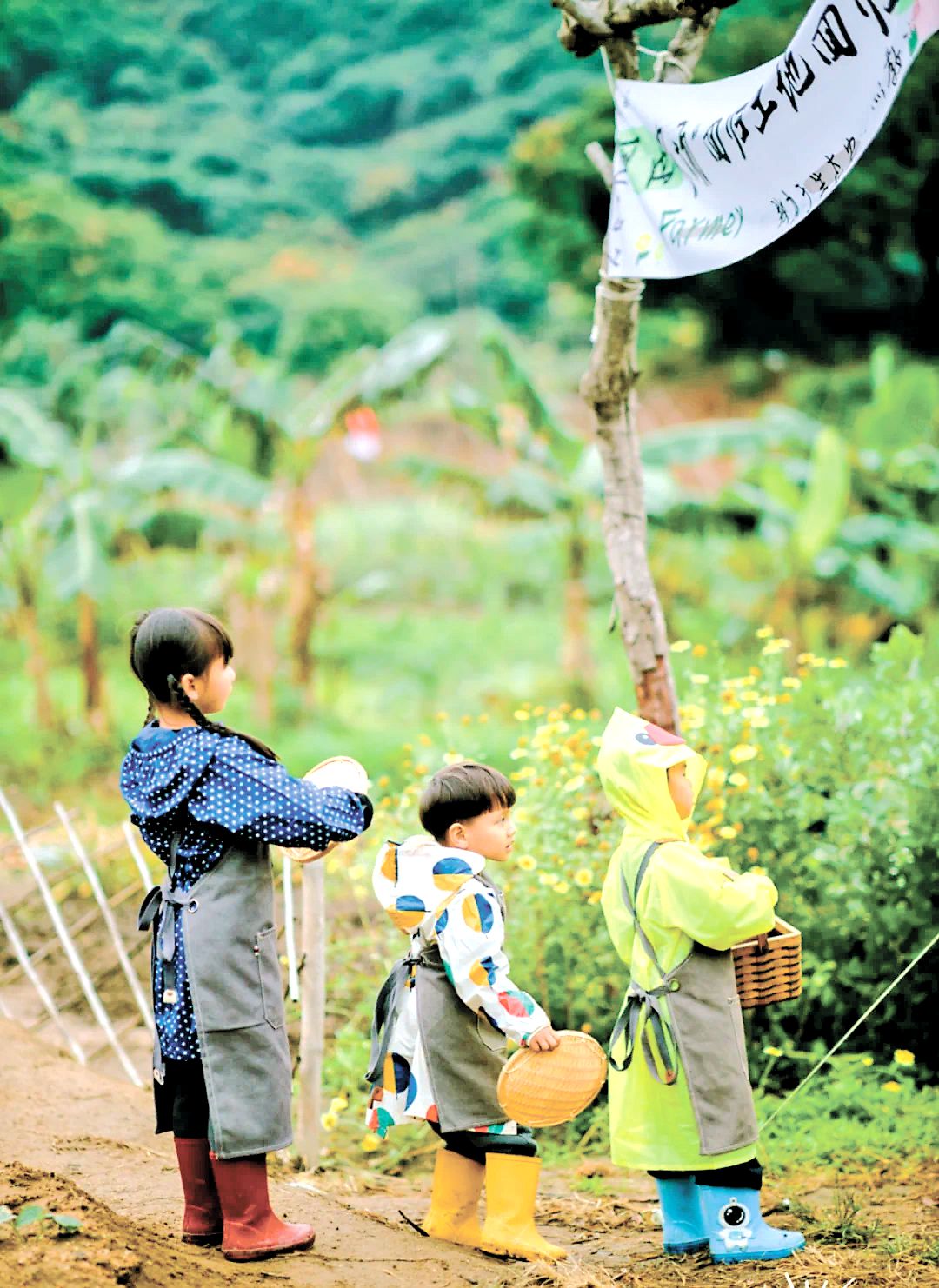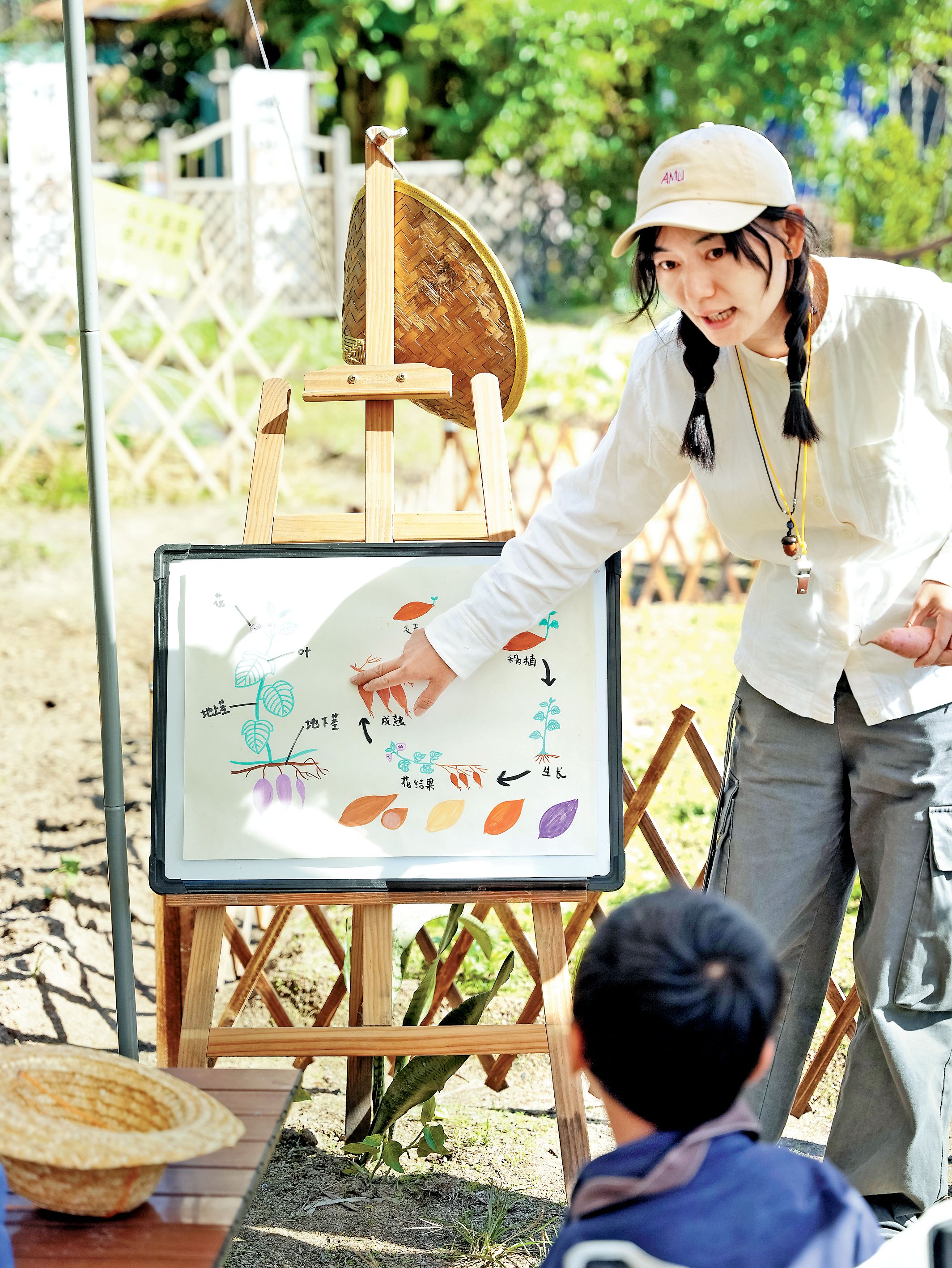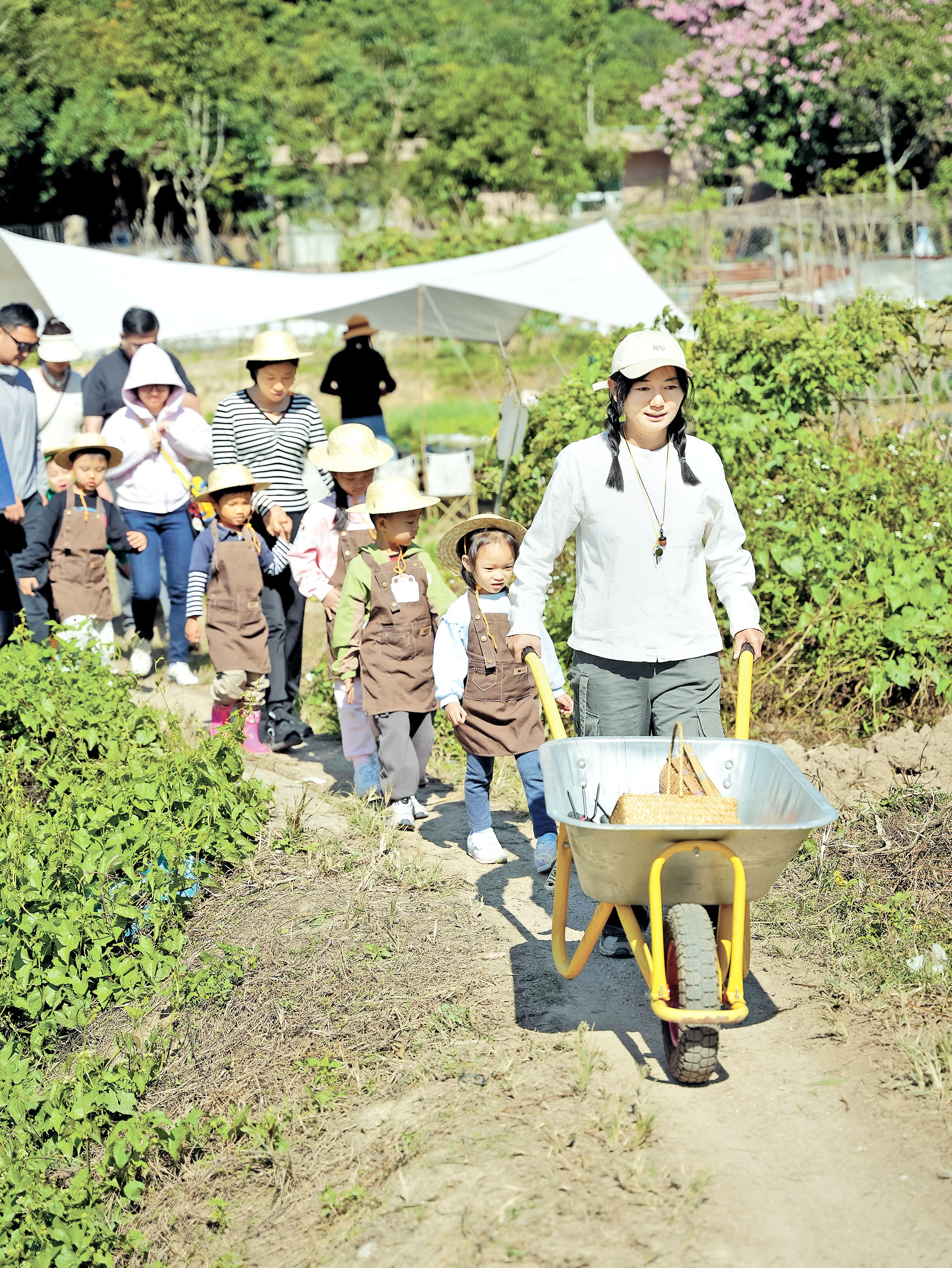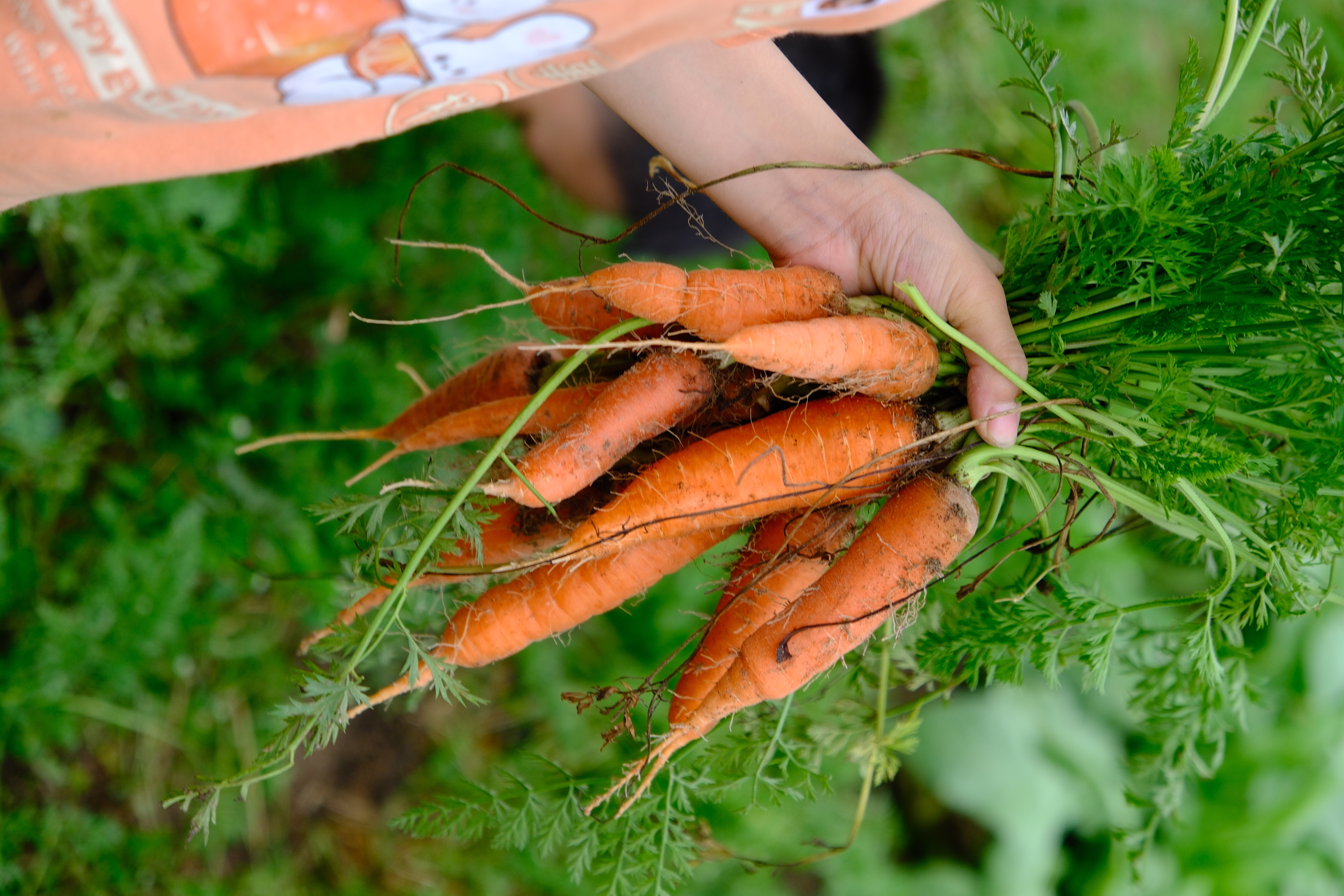'I have a farm in Nanshan': Shared farms gaining traction in SZ
Writer: Zhang Yu | Editor: Zhang Zhiqing | From: Original | Updated: 2025-04-17
At the foot of Yangtai Mountain at Makan Village in Xili, Nanshan District, there lies a tract of land that is leased to local residents for planting.
By paying a set fee, renters are granted the freedom to cultivate any variety of vegetables and fruits throughout their tenancy and experience the joy of harvest on a regular basis.

Children learn to do farm work at Axi Farm in Shenzhen's Nanshan District. Photos courtesy of the farm
This verdant expanse, known as Axi Farm, is managed by a young man named Zhang Ling. Axi is a term derived from the Tibetan language that signifies “a good place.” In the language of the Yi ethnic group, it means to “come together.”
Despite its urban surroundings, the farm stands as a serene oasis removed from the city’s hustle and bustle. Its advantageous location and pristine ecological setting make it a haven for urban farmers seeking respite from city life and a place to connect with the land, learn about sustainable agriculture, and taste the freshest produce.
A rural dream from Guizhou to Shenzhen
Zhang, who was raised in the rustic landscapes of Bijie, Guizhou Province, found his pastoral dream taking shape amidst the verdant mountains and clear waters of his birthplace.
There, he and his family championed the principles of ecological agriculture, eschewing pesticides and fertilizers to let the land flourish naturally.

Zhang Ling does farm work at the Axi farm.
In 2008, Zhang, who majored in food safety at university, ventured to Shenzhen after graduation. A year later, he launched his entrepreneurial journey in the city by establishing an online store dedicated to selling agricultural products sourced from his beloved hometown.
Over the years, he has been a frequent traveler between Guizhou and Shenzhen, engaging in the e-commerce industry for agricultural products. His mission has been to facilitate the development of internet sales channels for his hometown’s high-quality produce, ensuring that these treasures reach a wider audience.
In 2023, Zhang decided to officially make Shenzhen his home. “Having traversed half of China and resided in numerous cities and villages, my heart ultimately belongs to Shenzhen,” he reflected.
His initial goal was straightforward: to embrace the role of a city farmer in Shenzhen. He sought a piece of land where he could plant the seeds he brought from his hometown – potatoes, soybeans, and glutinous corn – letting these crops thrive under the natural sunlight and rain, free from the touch of synthetic pesticides, fertilizers, herbicides, or insecticides.

An instructor gives a class about plants at Axi Farm.
“For me, being able to consume green and healthy ingredients grown by my own hands is also a way to express my homesickness,” Zhang shared. Through farming, he hopes to find solace in nature and gradually put down roots in Shenzhen, blending his rural dreams with the urban landscape.
Amidst the verdant mountains of Shenzhen, with nothing but a hoe in hand and a plot of land under his feet, Zhang embarked on a profound dialogue with nature. As he delved into the art of farming, he came to a profound realization: society must reevaluate its relationship with the natural world. There is a growing yearning to step beyond the confines of modern life and reconnect with the earth.
Children require the nourishment of nature for their learning and growth, while adults seek its healing embrace. The demand for healthy, fresh vegetables has surged, becoming a shared desire for many, according to Zhang.
He recognized this as both a timely opportunity and a profound mission. Moreover, he observed that after over 40 years of rapid industrialization, Shenzhen is confronting significant challenges, including farmland protection, soil enhancement, and the conservation of biodiversity.
Nature education for urban families
Securing an ideal piece of farmland within the city limits is a challenging endeavor, and Zhang adheres to stringent criteria for land selection.
According to Zhang, arable land is already scarce in Shenzhen, a highly urbanized city. Some land has been subjected to the prolonged use of synthetic pesticides and fertilizers, falling short of the stringent requirements for ecological agriculture. Some plots require thorough soil remediation to restore their viability for eco-friendly farming before they can be offered for cultivation.

Families take part in farm work at Axi Farm.
After a diligent search, Zhang finally identified a suitable parcel of land in Nanshan. He leased over 10 acres and established a shared farm, hoping to spend 10 years guiding 10,000 Shenzhen families into farming, thereby reestablishing a deep and intimate connection between people and the land, agriculture, and the food they consume.
He divided some cultivated land into units of 10 square meters and rented them out in the form of annual packages, which quickly gained a lot of attention on social media platforms.
The farm has cultivated a distinctive community ethos. He stated that the shared farm is now home to four active WeChat groups, where members enthusiastically exchange planting tips and share live updates from their fields. The community is vibrant and harmonious, creating a supportive network for all who participate.
“Axi Farm is an education-oriented farm. I hope to impart valuable lessons about natural growth, sustainable living, and the essence of life to Shenzhen families. Beyond that, I aim to foster better family dynamics and parent-child relationships through the shared experience of farming,” Zhang said.

A harvest of vegetables at Axi Farm.
He noted that after more than two years of development, 800 Shenzhen families have embraced the shared vegetable garden project, with the majority being families with children aged 2 to 9 years old. This demographic is particularly eager to instill in their children a sense of nature education, agricultural awareness, and life skills.
As young farmers, the children take great pride in their small vegetable gardens. Many rented plots are enclosed with fences and adorned with personalized signs. These varied markers reflect the affection and sense of ownership that the young cultivators have for their own patches of green.
“Under the guidance of our composting and enzyme production technology, the families make full use of kitchen waste and resist using synthetic pesticides, fertilizers, herbicides, or insecticides during the farming process, effectively practicing ecological agriculture and a sustainable lifestyle,” he said.
Currently, the farm has a limited number of vegetable gardens, with the majority of the land dedicated to orchards. Additionally, there are 10 prime locations designated for flower cultivation.
A community for green development
According to Zhang, Axi Farm provides not only a piece of arable land, but also a complete service system, including planting guidance for ecological agriculture, nature education experience, intangible cultural heritage experience, catering, team building, planning, and other services.
He also hopes to transform the farm into a community for sustainable development, attracting related industries and enabling more of Shenzhen’s urban residents to discover the myriad possibilities farming offers.
“Ecological agriculture and nature education are my lifelong commitments and missions,” Zhang shared. He envisions expanding the Axi Farm model across Shenzhen and even the Guangdong-Hong Kong-Macao Greater Bay Area, establishing numerous sub-farms.
“Meanwhile, I remain dedicated to the rural revitalization efforts I have pursued for 17 years and strive to bring healthier ingredients to cities and contribute to the nation’s rural development agenda,” he said.
Q&A
Q: What is the fee for renting vegetable fields?
A: The prices vary depending on the location, lease term, area, and services provided. If no other services are needed, the cheapest option is 10 square meters of land, which costs 390 yuan (US$53) per year.
Q: What are the farming projects provided for tourists, and what do participants need to prepare?
A: We have half day, one-day, three-month, and one-year farming projects. Participants only need to wear suitable outdoor clothes, and we will provide seeds, seedlings, and tools. Most people rent for one year, which allows for year-round rotation of planting.
Q: Renters may only come to take care of crops on weekends. Who can take care of the garden from Monday to Friday?
A: Our farm provides custody services, including guidance on planting techniques, as well as digging, sowing, watering, fertilizing, weeding, loosening soil, thinning out seedlings, and providing photo feedback.
Q: Many residents want to experience planting, but their experience is limited. Are there any special plant varieties recommended for Shenzhen’s farming conditions?
A: Plant varieties vary in different seasons. Around May Day, it is suitable to plant melons (watermelon, pumpkin, etc.), beans, corn, okra, sweet potatoes, peanuts, ginger, sweet potato leaves, etc. You can also plant your favorite flowers or fruit trees.